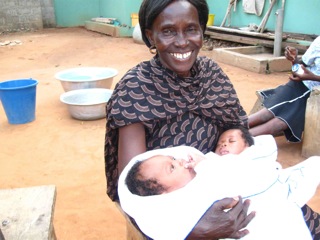Ablayo Dunyo
Name: Ablayo Dunyo
Gender: Female
Age: 68 years old
Birthplace: Dagbamete
Place of Residence: Dagbamete
Education: Level 5 Elementary
Occupation: farming (cassava, maize,
beans), midwife
Performance Groups: 5 different
groups, not including the Shrine- Unity
drumming, Akpoka drumming, Torwogbe,
Atsigo, Agbadza.
Translated by her son, Mawupemo Dunyo
Sitting with Ablayo Dunyo, I had the chance to learn about changes in the village in the
realm of its music and its aesthetics. Since Ablayo does not speak English, her son Mawupemo
joined us to act as an interpreter.
Ablayo was born in Dagbamete and continues to live there. I asked if she had noticed
much change in the village from when she was a child. “There has been a great change” she said.
Roads have been built where once there were small, narrow paths, electricity has replaced the
need for kerosene lanterns, and water is now pipe-born making trips to the well unnecessary.
Schools too have changed. Previously, they were made of some wood or classes were even held
under a nothing but a tree. Now, there is a schoolhouse. I also learned about the installation of
KVIP (Kumasi Ventilated-Improved Pit). These are the toilet houses that were an upgrade from
the small holes and boards that once were used.
The music too has gone through changes. At one time, there was a declining interest in
the traditional music. Ablayo feels that this was because of the appeal the Christian Church had
for the youth. When the youth converted to Christianity, “they forgot about tradition...the youth
didn’t pay attention to our tradition any longer.” However, they “realized they were being
mislead...and they are now following the traditions [again].” After that, the interest in traditional
music returned.
To be sure the interest in traditional music does not see another decline, the youth in the
village are passed the baton of traditional music. “Traditional music, in this community, is passed
onto the younger ones by way of witness.” She went on to explain that “there’s no specific place
whereby you go to be taught this and that: this is how things are done.” Instead, “whenever the
younger ones hear drumming, they will go and watch.” “As they visit, they see the way music
goes on, the way tradition goes on. As they grow, the more you keep [seeing] and the more you
learn.” By getting involved, the music is passed on from generation to generation.
One of the places where the youth will “witness” the traditional music is in the Shrine.
Ablayo, a member of the Apetorku Shrine, feels that music is used at the Shrine not only to
invoke the Spirits, but also for dancing. “[As] they dance and they get strength and energy.”
Ablayo prefers traditional and recreational music over other genres. As a member of many
groups and ensembles, this is where she hears the music. It is because she likes the music that
she is a member of these groups. “If I didn’t like it, I wouldn’t do it,” she stated. “When you
understand some [style] of music, that is the [type of music] that you will follow.”
Since Ablayo has seen many changes in Dagbamete, I wondered what she thought about
the effect of technology. She feels that technology has brought a lot of advantages to the
community. The radio can provide music for entertainment, and the TV allows you “to know
what is going on in the world.” Technology, like recorders, allows for records to be kept and
passed on. Overall, she feels it has had a tremendous positive effect in Dagbamete, and on their
lives.
Other positive developments in the village may be due to the Kathy Armstrong Lodge
and West African Cultural Exchange (WACE). Previous to the lodge’s construction, people lived
in small, mud houses with their families. These organizations have brought other improvements
to infrastructure such as schools. People from other countries come to visit and learn because
they enjoy the experience. This benefits the village. Ablayo hopes it will continue in the same
manner, leading to the construction of more buildings and structures.
Ablayo does not worry about the effect Western influences could have on the traditions of
Dagbamete. “We are used to our tradition, and that is your tradition. So, if you bring yours, it’s
like an exchange of music and tradition” she stated. Because of the villages strong roots in
tradition, there is no threat of changing it. “That will only happen when you do not know where
you are coming from” she explained. “We are learning together and we are learning from each
other. “
Interviewed by Sherri Twarog, Summer 2010
